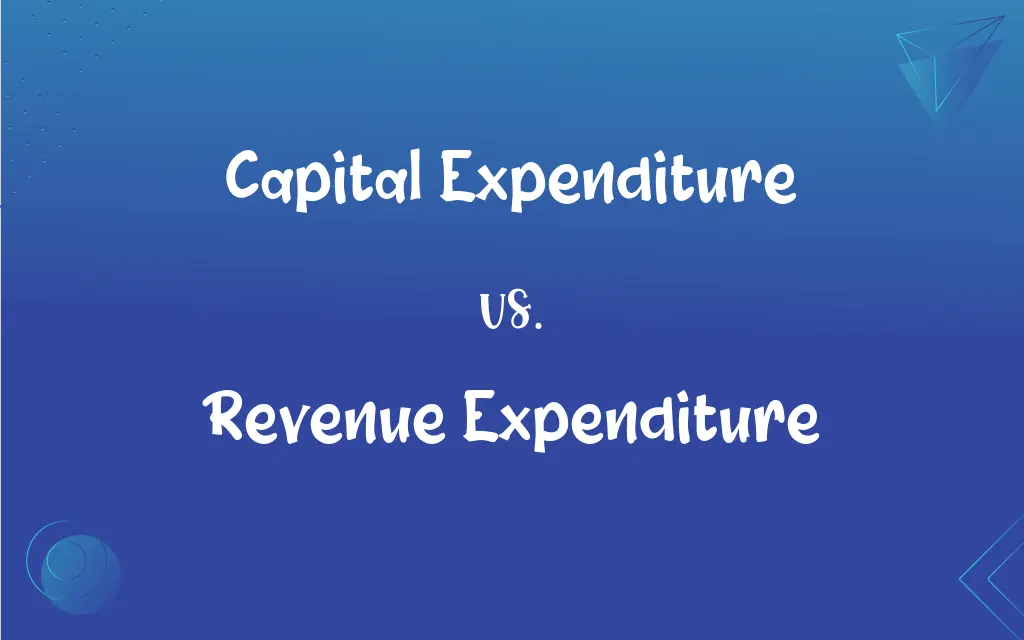Capital Expenditure vs. Revenue Expenditure: What's the Difference?
Edited by Aimie Carlson || By Harlon Moss || Updated on October 20, 2023
Capital expenditure is money spent on acquiring or improving long-term assets; revenue expenditure is for daily operations and short-term needs.

Key Differences
Capital expenditure and revenue expenditure are essential terms in accounting and finance.
Capital expenditure refers to the money spent by a business or organization on buying, maintaining, or improving its long-term assets like buildings, machinery, and equipment. These are considered investments and offer benefits to the company for several years. On the other hand, revenue expenditure is related to the day-to-day operations of a business. It includes expenses like salaries, rent, utilities, and other recurring costs.
When distinguishing between capital expenditure and revenue expenditure,
Capital expenditure typically results in the creation of a new asset or extends the life of an existing asset. This means that its benefits are realized over multiple accounting periods, and it's often capitalized on the balance sheet. Revenue expenditure, in contrast, is consumed within a single accounting period. These costs are often routine, and they are immediately charged against profits in the income statement.
The treatment of capital expenditure and revenue expenditure differs in financial statements.
ADVERTISEMENT
Capital expenditure, being a long-term investment, is capitalized and then depreciated over its useful life. This allows the expense to be spread out over several years, reducing its immediate impact on profits. Revenue expenditure, however, directly affects the profit and loss account in the period in which it's incurred, as it doesn’t add lasting value to the company.
Both capital expenditure and revenue expenditure play a vital role in a company’s financial health.
While capital expenditure is a reflection of a company's growth and future plans, revenue expenditure shows its operational efficiency and its ability to manage its recurring costs. A business needs to strike a balance between these two to ensure sustainable growth.
Comparison Chart
Nature
Long-term investment in assets.
Short-term, operational costs.
Duration of Benefit
Spans over multiple accounting periods.
Benefits realized within a single accounting period.
ADVERTISEMENT
Financial Statement
Capitalized on the balance sheet.
Expensed on the income statement.
Example
Buying machinery or a building.
Salaries, rent, utilities.
Impact on Profit
Depreciated over several years, reducing yearly profit impact.
Directly affects profits in the period it's incurred.
Capital Expenditure and Revenue Expenditure Definitions
Capital Expenditure
Capital expenditure represents financial commitments to projects or assets with expectations of future returns.
The board approved a capital expenditure for the new research and development wing.
Revenue Expenditure
Revenue expenditure is money spent on daily business operations and immediate needs.
Their monthly revenue expenditure on salaries is substantial due to a large workforce.
Capital Expenditure
Capital expenditure is the money spent on buying or improving long-term assets.
The company made a significant capital expenditure on a new factory.
Revenue Expenditure
Revenue expenditure encompasses costs that provide immediate benefit but don’t enhance asset value.
Despite the product launch's success, the revenue expenditure on advertising was high.
Capital Expenditure
Capital expenditure includes outflows that enhance the capacity or lifespan of assets.
By dedicating a substantial capital expenditure to machinery upgrades, they increased production rates.
Revenue Expenditure
Revenue expenditure directly affects a company’s profit and loss for a specific period.
A sudden increase in marketing costs led to higher revenue expenditure this quarter.
Capital Expenditure
Capital expenditure denotes investments in tangible or intangible assets that benefit the company over multiple years.
Their capital expenditure on advanced technology has given them a market edge.
Revenue Expenditure
Revenue expenditure doesn't result in the creation of a long-term asset for the company.
The revenue expenditure on office supplies doesn't add lasting value but is essential for operations.
Capital Expenditure
Capital expenditure can be funds allocated for either acquiring new assets or upgrading existing ones.
The latest capital expenditure will modernize the entire fleet of delivery vehicles.
Revenue Expenditure
Revenue expenditure consists of routine expenses necessary to keep a business running.
The revenue expenditure for maintaining the office includes rent and utilities.
FAQs
What is capital expenditure?
Capital expenditure is money spent on acquiring or improving long-term assets.
Can capital expenditure benefit a business in the long run?
Yes, capital expenditure often results in long-term assets that benefit the company over multiple years.
How does revenue expenditure differ from capital expenditure?
Revenue expenditure is for daily operations and short-term needs, while capital expenditure is for long-term assets.
How is capital expenditure treated in financial statements?
It's capitalized on the balance sheet and then depreciated over its useful life.
Are salaries and rent considered capital or revenue expenditure?
They are considered revenue expenditure as they are recurring operational costs.
Is revenue expenditure immediately expensed?
Yes, revenue expenditure directly affects the profit and loss account in the period it's incurred.
Can software development be a capital expenditure?
Yes, if the software provides long-term benefits to the company, it can be categorized as capital expenditure.
How does one differentiate between the two in financial management?
Capital expenditure relates to long-term investments in assets, while revenue expenditure deals with day-to-day costs.
How do businesses fund their capital expenditure?
They can use internal funds, loans, issuing shares, or other financing methods.
Is asset depreciation a result of capital expenditure?
Yes, assets acquired through capital expenditure are depreciated over their useful life.
Why is it essential for businesses to differentiate between the two expenditures?
Differentiating helps in accurate financial reporting, tax computations, and strategic planning.
Can capital expenditure impact a company's future growth?
Absolutely, capital expenditure can be a reflection of a company's growth and future plans.
Can maintenance costs be considered capital expenditure?
If the maintenance extends the life of an asset significantly, it can be capital expenditure; otherwise, it's revenue expenditure.
Are advertising costs a revenue expenditure?
Yes, advertising costs are generally considered revenue expenditure as they're for immediate needs.
Are training costs for employees considered capital or revenue expenditure?
Typically, they are revenue expenditure as they don't result in a long-term asset.
Does revenue expenditure add to the asset value of a company?
No, revenue expenditure doesn’t add lasting value but covers the costs of daily operations.
Does capital expenditure always mean physical assets?
No, it can also include intangible assets like patents or copyrights.
Can revenue expenditure impact a company’s profitability?
Yes, since it's expensed immediately, high revenue expenditure can reduce profits.
Is buying a new building a revenue or capital expenditure?
It's a capital expenditure since it's a long-term asset acquisition.
Are monthly utilities like electricity bills considered capital or revenue expenditure?
They are revenue expenditure, as they pertain to the day-to-day operations of a business.
About Author
Written by
Harlon MossHarlon is a seasoned quality moderator and accomplished content writer for Difference Wiki. An alumnus of the prestigious University of California, he earned his degree in Computer Science. Leveraging his academic background, Harlon brings a meticulous and informed perspective to his work, ensuring content accuracy and excellence.
Edited by
Aimie CarlsonAimie Carlson, holding a master's degree in English literature, is a fervent English language enthusiast. She lends her writing talents to Difference Wiki, a prominent website that specializes in comparisons, offering readers insightful analyses that both captivate and inform.
































































